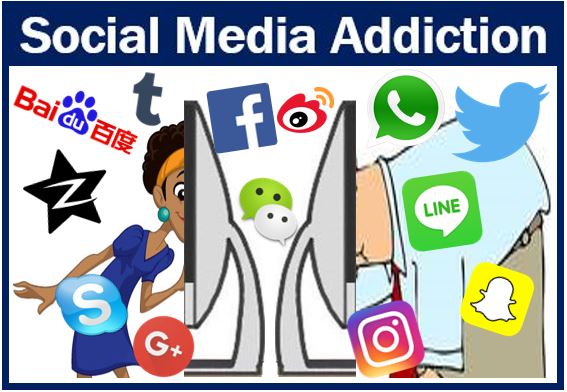Social media addiction is similar to drug addiction, say researchers from Michigan State University. There is a connection between social media use and risky decision-making. This connection is also common in substance abuse, the researchers found.
The Michigan researchers, as well as colleagues from Monash University (Australia) and McGill University (Canada), wrote about their study and findings in the Journal of Behavioral Addictions (citation below). The authors were Dar Meshi, Anastassia Elizarova, Andrew Bender, and Antonio Verdejo-Garcia.
Lead author, Dar Meshi, an Assistant Professor at Michigan State University’s (MSU’s) Department of Advertising and Public Relations, said:
“Around one-third of humans on the planet are using social media, and some of these people are displaying maladaptive, excessive use of these sites. Our findings will hopefully motivate the field to take social media overuse seriously.”

Social media and social media addiction
Social media addiction is a phrase we use to refer to people who spend too much time on social media websites. We also call it social networking addiction. Social media websites include, for example, Facebook, Instagram, and Twitter.
Social media refers to websites and applications that enable us to create and share content in social networking sites and blogs.
Many websites and apps are dedicated to social networking, social bookmarking, and virtual worlds.
Social media and risky decision-making
This is the first study to look at the relationship between people’s social media use and risky decision-making capabilities.
Prof. Meshi said:
“Decision making is oftentimes compromised in individuals with substance use disorders. They sometimes fail to learn from their mistakes and continue down a path of negative outcomes.”
“But no one previously looked at this behavior as it relates to excessive social media users, so we investigated this possible parallel between excessive social media users and substance abusers. While we didn’t test for the cause of poor decision-making, we tested for its correlation with problematic social media use.”
Survey to determine social media addiction
The authors asked 71 people to take part in a survey. It measured their psychological dependence on Facebook.
Participants answered questions regarding their preoccupation with the platform. They commented on how they felt when they were unable to use it and whether they had tried to quit. The survey also asked them what impact Facebook had had on their studies or jobs.
The participants then had to do the Iowa Gambling task. Psychologists use it to measure decision-making.
People must identify outcome patterns in packs of cards so that they can choose the best possible deck.
The researchers found that participants with social media addiction had the worst performance. In other words, they were more likely to choose from bad decks than the other participants.
The better they performed in the task, the less their social media use was. This result complements the results with people who abuse drugs such as cocaine, opioids, and methamphetamines.
Individuals with substance abuse have similar outcomes on the Iowa Gambling Task, thus showing a similar deficiency in decision-making.
Understanding causes of social media addiction
Prof. Meshi says that we need to gain a better understanding of what drives people to excessive social media use.
Prof. Meshi said:
“With so many people around the world using social media, it’s critical for us to understand its use. I believe that social media has tremendous benefits for individuals, but there’s also a dark side when people can’t pull themselves away.”
“We need to better understand this drive so we can determine if excessive social media use should be considered an addiction.”
Citation
“Excessive social media users demonstrate impaired decision making in the Iowa Gambling Task,” Dar Meshi, Anastassia Elizarova, Andrew Bender, and Antonio Verdejo-Garcia. Journal of Behavioral Addictions. DOI: https://doi.org/10.1556/2006.7.2018.138.

